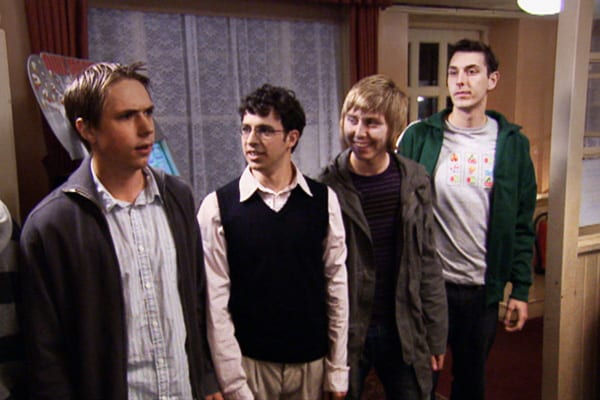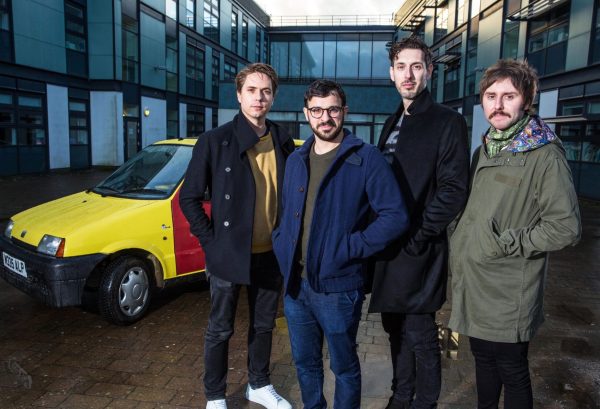This comedy was about the embarrassment of being desperate – unfortunately, that doesn’t end in adolescence
I’ll never understand people who say The Inbetweeners is dated. 2008 might feel like a long time ago, but it wasn’t what you’d call “acceptable” back then to use phrases like “bumder” and “frothing at the gash” and “knee deep in grammar school clunge”.
As far as I remember from that time, when like its four central idiots I too was in Sixth Form, it wasn’t de rigueur to masturbate over the residents during work experience at an old people’s home, or solicit blow jobs from women selling Cornettos on the seafront on a Geography field trip, or scream at a group of people with Down’s Syndrome for taking the front-row seats on Nemesis Inferno.
The entire point of this completely brilliant comedy – about suburban mediocrity, the mortifying condition of being alive, and the strenuous pursuit of seeing a girl’s “big jugs” in the flesh – was to lampoon the disgusting, lawless, astonishing stupidity of the teenage boy, rather than glorify it. And it has proven timeless to just about everyone I know because it turns out that (apart from the obsession with big jugs) most of the Inbetweeners’ weaknesses and desires are not the preserve of the adolescent.
The Inbetweeners – which is reported to be returning, 15 years since its third, final series and 11 since its last of two films – had it all. The slapstick was obvious: Neil punching a fish to death, Simon throwing up “vodka, whiskey and a load of crème de menthe” over a small child’s head or walking the school fashion show with his bollock out.
Toilet humour was exploited both through wordplay and very literally: Jay’s dad exploding in the caravan, Will overdosing on the Pro Plus while sitting his AS Levels. And the satire – well it was everywhere, especially in the form of Jay, man of a hundred investigable sexual fantasies and mendacious accidental poet. I especially cherished his claim that his drug dealer had “f**ked off” on a gap year to Afghanistan to score some “pure shit from source”.
All of that was and is hysterically funny. But what elevated it to a classic was how well it understood just how weird and pathetic people are. The best joke throughout its three series for me was how much Simon hated his perfectly reasonable mother. For no reason at all, while trying to impress a girl, he called her a “stupid b**ch”.

That was Simon all over: spineless, desperate to be cool, short-tempered, a reliably poor judge of every circumstance in which he ever found himself. Will, too, was an uncomfortably familiar personality: pompous, supercilious, shallow, self-pitying and entitled. The outrageous Jay was a baron of the crass whose lies about his sexual adventurousness belied vulnerability and inexperience and a lifetime of bullying from his even more unpleasant father. And then there was gormless, gentle, mostly benign Neil, the only one thick enough to be impressed by Jay and also the only one to get his end away (and a fair amount of Lego up his bum).
None of these characters were defined by their age so much as their mediocrity. They were caricatures, yes, but also aggressively unremarkable, from their comprehensive school to their new-build culs de sac to their crap Burton clothes. Watching it now, you can still smell the Lynx through the TV screen and in their normalcy, we recognise ourselves.
And despite Will, at least, having the ambition of growing up to enter politics or the media, and his superior talents at last being awarded the recognition Mr Gilbert would never accord, I rather suspect that in adulthood we would find the four of them very much the same. A bit cowardly, merciless with their friends, hopeless with the opposite sex, ultimately quite good people but employing considerable artifice to dissuade others, and themselves, from clocking how average their lives are. It is a rich seam.

I am usually wary when it comes to comedy reunions and revivals, especially when they are both beloved to me, and a cash cow. But I did not recoil upon hearing the news that The Inbetweeners’ creators, Damon Beesley and Iain Morris, have reportedly signed a deal with production company Banijay, teasing that it is “incredibly exciting to be plotting more adventures for our four favourite friends (ooh friends)”.
Because as I now know, life in one’s thirties is still regularly excruciating, and our personalities do not really change much from the desperate, selfish teenagers we once were – we just learn to hide it a bit better. These characters were written to perfectly allow us to empathise, without sympathising.
Times and sensitivities have changed, and I would hope that even the most puerile teenagers of today wouldn’t make the same sexist, homophobic jokes these boys did. But provided the men have developed a little more reverence for women beyond their orifices and have learned not to greet each other “morning, benders”, I see no reason that mining their millennial adulthood and its attendant grievances could not continue to be as ridiculous and unbearable as those three original series that became a great sensation of 21st century British comedy.
The Inbetweeners is often called a “coming of age” comedy – but it wasn’t really about coming of age. It was about wanting to look cool, feel important, and be loved, and the universal embarrassment of attempting any of it at all. Anyone who thinks you grow up and grow out of that is, I’m afraid, as deluded as Jay when he told his mates Caravan Club was “one big sex club all over Europe”.
